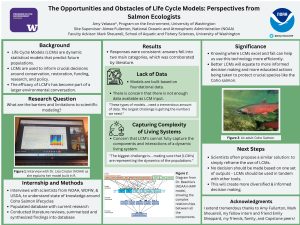THE OPPORTUNITIES AND OBSTACLES OF LIFE CYCLE MODELS: PERSPECTIVES FROM SALMON ECOLOGISTS
The Life Cycle Model (LCM) is a tool used by NOAA and other groups to predict populations in the face of changing environmental conditions, and these population estimates are often used to inform conservation, restoration, and policy decisions. These models inherently come with some degree of unreliability, and awareness of the challenges that come with modeling can help all users make better judgments and more informed decision making. The aim of this study was to understand where LCMs begin to fail us based on direct opinions of the very scientists that create and use these models. In this internship, I conducted expert interviews with scientists from NOAA, WDFW, USDA, and others to understand the current state of knowledge surrounding salmon ecology, and how LCMs have helped and hindered that progression of knowledge. I then worked to construct and populate a database through which current research and LCMs are synthesized and summarized. Through the interviews, I identified two major categories of concern: lack of data to inform models (likely attributed to underfunding as well as logistical issues of studying live organisms), as well as potential inability to capture the complexity of dynamic living systems. Being educated and understanding the opportunities and obstacles of LCMs can help us use this technology more efficiently. Moving forward, scientists largely agree that LCMs are undoubtedly extremely valuable, just potentially one part of a broader system of tools that can work together to promote more informed decision making.
